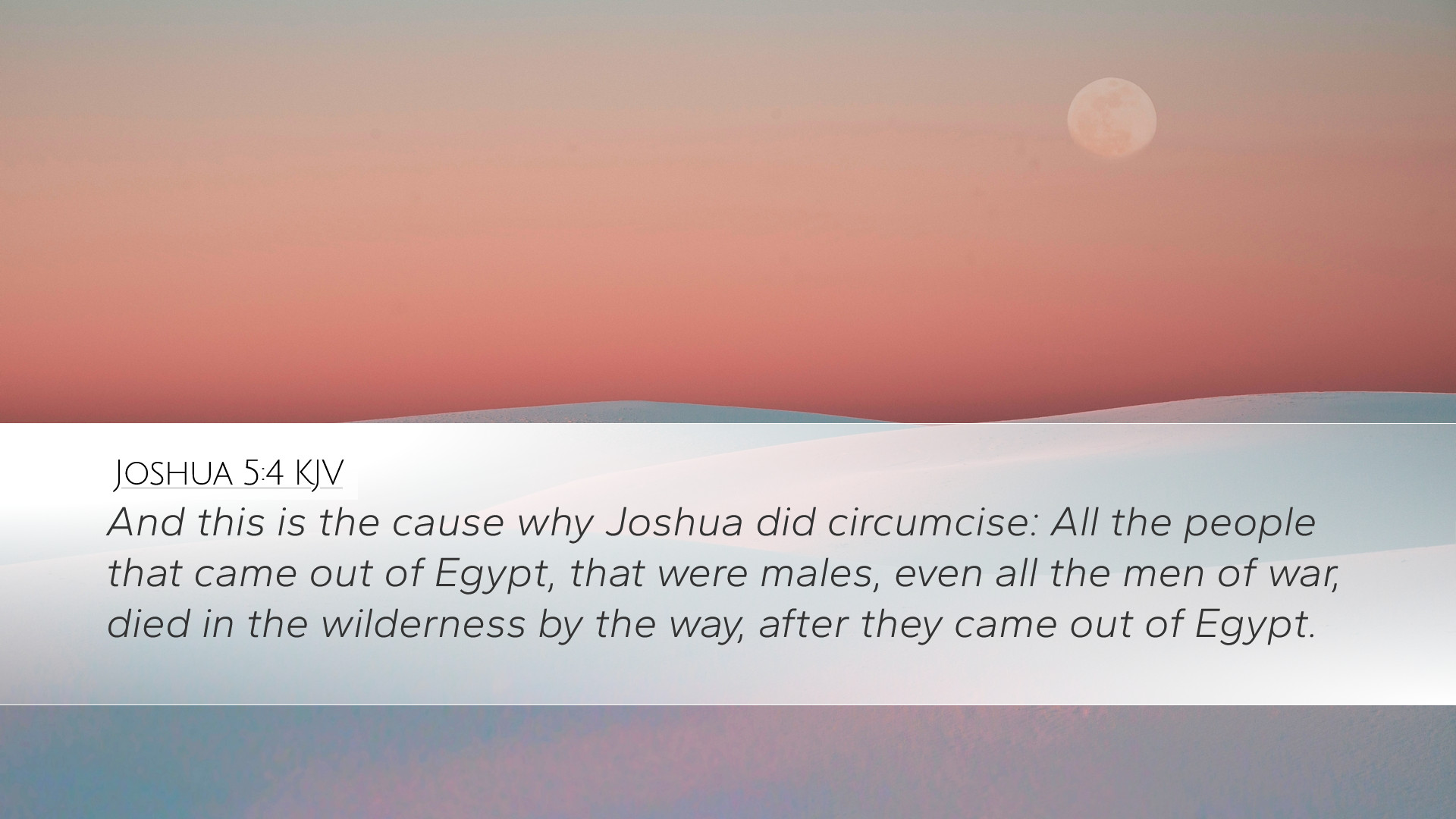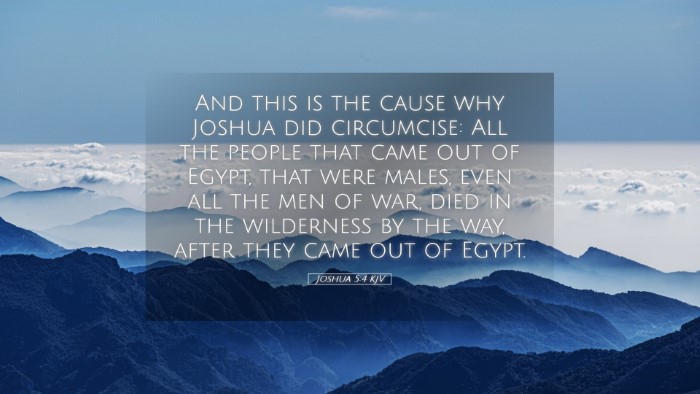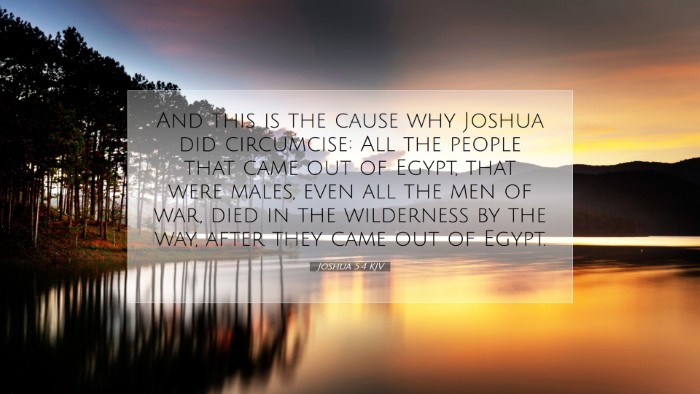Old Testament
Genesis Exodus Leviticus Numbers Deuteronomy Joshua Judges Ruth 1 Samuel 2 Samuel 1 Kings 2 Kings 1 Chronicles 2 Chronicles Ezra Nehemiah Esther Job Psalms Proverbs Ecclesiastes Song of Solomon Isaiah Jeremiah Lamentations Ezekiel Daniel Hosea Joel Amos Obadiah Jonah Micah Nahum Habakkuk Zephaniah Haggai Zechariah MalachiJoshua 5:4
Joshua 5:4 KJV
And this is the cause why Joshua did circumcise: All the people that came out of Egypt, that were males, even all the men of war, died in the wilderness by the way, after they came out of Egypt.
Joshua 5:4 Bible Commentary
Commentary on Joshua 5:4
Joshua 5:4 states, "And this is the cause why Joshua did circumcise: all the people that came out of Egypt, that were males, even all the men of war, died in the wilderness by the way, after they came out of Egypt." This verse highlights a pivotal moment in the Israelite history as they prepare to conquer Canaan. The act of circumcision is deeply intertwined with Israel's identity and covenantal relationship with God.
Contextual Overview
The context of this scripture revolves around the Israelites' transition from a nomadic existence in the wilderness to a settled life in Canaan. As they approach the Promised Land, God commands Joshua to perform the rite of circumcision on the new generation. This moment is not merely physical; it signifies a spiritual recommitment to God and the covenant established with Abraham.
Key Themes
- Covenantal Renewal: The act of circumcision is a sign of the covenant. Matthew Henry emphasizes that this rite is a reaffirmation of God's promises to His people. The new generation must be consecrated to God's service before taking possession of the land.
- Transition and Identity: Albert Barnes notes that this generation had not known Egypt as their identity, so the act of circumcision reconnects them with their heritage as God's chosen people.
- Spiritual Preparation: Adam Clarke highlights that physical circumcision symbolizes spiritual purification; before they engage in warfare, they must be spiritually ready to fulfill God's mission.
Insights from Public Domain Commentaries
Public domain commentaries offer a wealth of insight into Joshua 5:4, drawing from historical, theological, and practical perspectives.
Matthew Henry's Commentary
Matthew Henry elaborates on the significance of this moment, explaining that it served as a reminder of God's faithfulness and the necessity of obedience. He underscores that this rite was not merely an ancient custom but a necessary act to align the people with God's plans. Henry remarks on the importance of reinstating the covenant sign among those who had not been circumcised during their wanderings, signifying the purification of the people for their upcoming challenges.
Albert Barnes' Notes
Albert Barnes focuses on the historical context, noting that all the males who left Egypt had perished due to disobedience, creating a generational gap. The Rite of Circumcision mandated that the new generation be marked as God’s own, distinguishing them from their predecessors who had succumbed to doubt and rebellion. Barnes asserts that this renewal of the covenant is crucial for the new generation as they stand on the brink of entering the Promised Land, emphasizing God’s unfailing commitment towards His people.
Adam Clarke's Exposition
Adam Clarke provides a thorough exploration of the significance of circumcision, linking it to the spiritual and communal identity of Israel. He notes that the physical act of circumcision is a profound symbol of cutting away the flesh, which can be interpreted as a metaphor for the removal of sinfulness and worldliness. Clarke highlights that before embarking upon the invasion of Canaan, this purification was essential for both their physical safety and their spiritual readiness. Clarke also hints at the broader theological implications of obedience and holiness in the life of a believer.
Theological Implications
This verse brings forth several theological implications that are vital to the understanding of God’s interactions with His people:
- Covenant Theology: The theme of covenant is central throughout Scripture. The act of circumcision serves as an outward sign of the inward reality of God's chosen people, reminding believers of their ongoing relationship with Him.
- Spiritual Readiness: The importance of being spiritually prepared for what lies ahead cannot be overstated. As Joshua prepares the people for military conquest, they first undergo a necessary spiritual rite. This speaks to contemporary believers regarding the need for spiritual preparation in the face of life’s challenges.
- Generational Influence: The fate of the previous generation serves as a warning, highlighting the necessity for each new generation to renew their commitment to God. This underscores the responsibility of current believers to pass on the faith effectively to the next generation.
Application for Today
The lessons gleaned from Joshua 5:4 and its commentaries remain pertinent for pastors, students, theologians, and Bible scholars:
- Emphasizing Covenant in Ministry: Understanding the covenantal aspects of faith can shape one’s approach to ministry and community life, ensuring that individuals recognize their identity as part of God's chosen people.
- Spiritual Condition and Preparation: Evaluating personal and communal spiritual readiness should be a priority. As Joshua circumcised the new generation, modern believers must engage in self-examination and repentance to align with God’s will.
- Educating Future Generations: It is essential to teach the next generation about their heritage and identity in Christ, ensuring they are effectively equipped to face the challenges of their time.
Conclusion
Joshua 5:4 encapsulates a profound moment in the unfolding narrative of God’s relationship with His people. Through the act of circumcision, God not only marks the new generation but also reinforces the call to holiness, obedience, and faith. Insights from esteemed commentators highlight the enduring significance of this command and its implications for both historical and contemporary audiences. As believers engage with this passage, they are reminded of the importance of their identity in Christ and the call to live in covenant fidelity.


